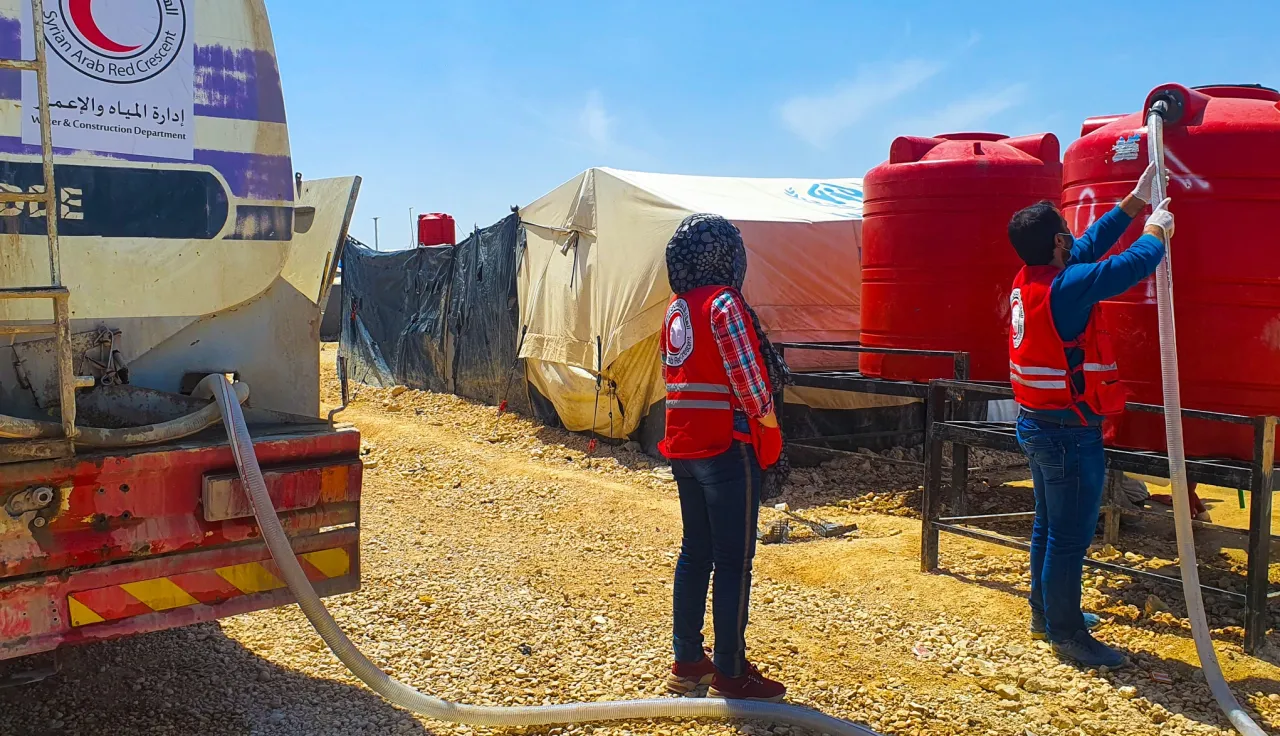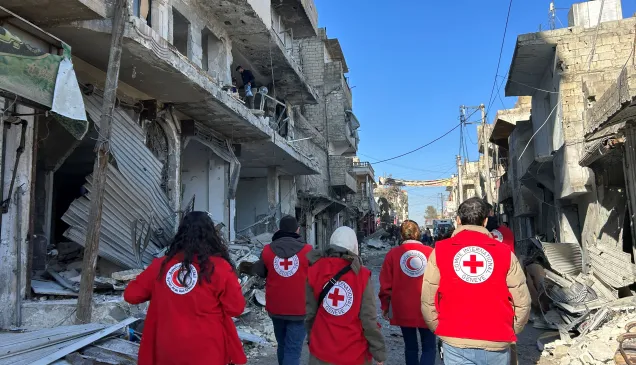Only one of the 16 hospitals in the north-east is fully functioning and more than half of all public health centres are out of service. Sporadic water shortages disrupt daily life and weaken people’s ability to take basic hygiene precautions against COVID-19. In some places, generators have become the only source of power. Families have been displaced repeatedly, often left with no choice but to return to towns and villages where public services have collapsed.
“For millions of people in north-east Syria, consequences of fighting, shortages of water, food and medicine, a lack of electricity, the economic downturn with job losses and price hikes are as much of a worry as coronavirus, arguably even more so right now,” said Karim Mahmoud, the ICRC head of Hassakeh office.
“There’s a risk that profound crises will worsen, hidden in plain sight, while the world’s attention is on coronavirus. The international community, humanitarian actors and donors must respond to the pandemic without losing sight of chronic conflict-related needs in places like Syria’s north-east,” said Fabrizio Carboni, the ICRC’s regional director for Near and Middle East, in Geneva.
Together with the Syrian Arab Red Crescent (SARC), the International Committee of the Red Cross (ICRC) is responding to the most pressing needs, carrying out urgent repairs to critical water infrastructure, distributing food and daily hot meals to the most vulnerable people, and supporting health care services in communities and in camps.
Our operational update for March-May 2020:
Water:
Water shortages remain one of the main concerns of the civilian population in Hassekeh, Deir Ezzor, and Raqqa governorates. There has been a huge need to support water authorities, carry out urgent repairs, provide necessary equipment for water treatment, and supply camps with clean water.
In Deir Ezzor, the destruction extended to the water supply system, and most water treatment plants, stations, and networks have been out of service. Prior to the conflict, the main source for water in the city was Al Basel Water Station, which has been damaged and is now running at very low capacity. The only source of drinking water in the city now is Al-Joura water station which the ICRC rehabilitated and equipped with pumping sets and other necessary materials.
Many families returned to heavily damaged neighbourhoods where the water network had been affected by the military operations. The ICRC, with the support of SARC, provides daily water trucking in these areas.
In Raqqa, people receive water once a week from the main water station, while in the rural areas families often resort to filling their own personal trucks directly from the Euphrates river to compensate for a lack of water from the main station. The ICRC has committed to fully rehabilitate the Debsi Afnan water station in the southern rural area, which will serve more than 20,000 people.
In Hassakeh, the Allouk water station, which has experienced numerous disruptions, is the only source for drinking water for approximately 800,000 people, in addition to being the main source for water trucking for Al Hol, Al Areesha and Al Twinah camps.
The ICRC and SARC have been providing clean water through water trucking and installation of water tanks in Al Hol camp in addition to supporting internally displaced people's centres in Hassakeh city to provide the minimum water needed for hygiene and drinking.
Health:
In the north-east, most of the health facilities are not functioning or are partially functioning. Out of 16 hospitals, only one is fully functioning, eight are partially functioning, and seven are not functioning at all, according to the consolidated Health Resources Availability Monitoring System (HeRAMS). None of the districts in the north-east meet the emergency threshold of at least ten hospital beds per 10,000 people.
Internally displaced people centres and camps are putting an additional burden on the already weak health system. In the camps where an estimated two-thirds of the population are children, the medical needs remain huge, including mother and child health care, pediatrics, surgery, mental health, and physical rehabilitation.
The ICRC-SARC field hospital’s medical team received more than 2,670 patients in two months, mainly children who are greatly exposed to many health hazards including diarrhea, malnutrition, and injuries. Lately, COVID-19 is another worry, although there has been no confirmed case in any camps.
Medical needs remain huge either for pediatrics, surgery, and mental health across north-east Syria where the population has been exposed to repeated trauma and extreme stress. From March to April 2020, nearly 2,800 people received improved health care services through the ICRC support to two SARC polyclinics in Hassakeh and Qamshli.
An additional 1,180 people benefited from 18 SARC-supported mobile health clinics in Hassakeh city. Recently the ICRC and SARC teams finalized setting up a COVID-19 isolation centre in Al Hol camp and working on supporting a quarantine centre in Hassakeh city.
Displacement and food assistance:
Hassakeh continues to host thousands of displaced people who have fled areas affected by hostilities, in addition to long-term refugees from Iraq. The ICRC works in 21 out of 51 internally displaced people centres in Hassekeh. In Qusair and Radwan Bakkary centres, the ICRC is rehabilitating latrines and conducting minor electrical works. In al Roj camp, the ICRC is installing 400 tents and constructing a drainage system.
The community collective kitchen in the Al-Hol camp is providing thousands of meals on a daily basis; in Marchto April alone it provided more than 330,000 meals to families in the camp.
Returnees and displaced people have been experiencing food shortages and have been burdened by an increase in prices. In rural Raqqa, people were getting only one bag of bread every three days and had to pay five times the price per bundle to secure their daily family needs. The ICRC and SARC continue to cover food gaps in some districts of Hassakeh governorate through distributing food parcels, and supporting farmers with wheat, barley seeds, fertilizer, and vegetable growing kits.
9 million people in Syria don't have enough food every day.
That's around half the population.
1 in 2 people can't afford or access food. pic.twitter.com/nkkY5fXY5L— ICRC (@ICRC) June 12, 2020
In Raqqa, the ICRC supported rehabilitation of the main public bakery in Al Sabkha, which has resumed its production recently of 4,800 kg of bread per day benefiting a population of around 55,000.
For more information:
Adnan Hezam, ICRC Syria, Tel.: +963 930 336 718, ahezam@icrc.org
Sarah Alzawqari, ICRC Middle East spokesperson, +961 3138 353, salzawqari@icrc.org
Ruth Hetherington, ICRC Middle East spokesperson, +41 79 447 3726, rhetherington@icrc.org
To preview and download the latest ICRC video footage from North-East Syria in broadcast quality, go here
To find out what the ICRC is doing to put an end to attacks on health workers and patients, go to
Follow the ICRC on facebook.com/icrc and twitter.com/icrc




